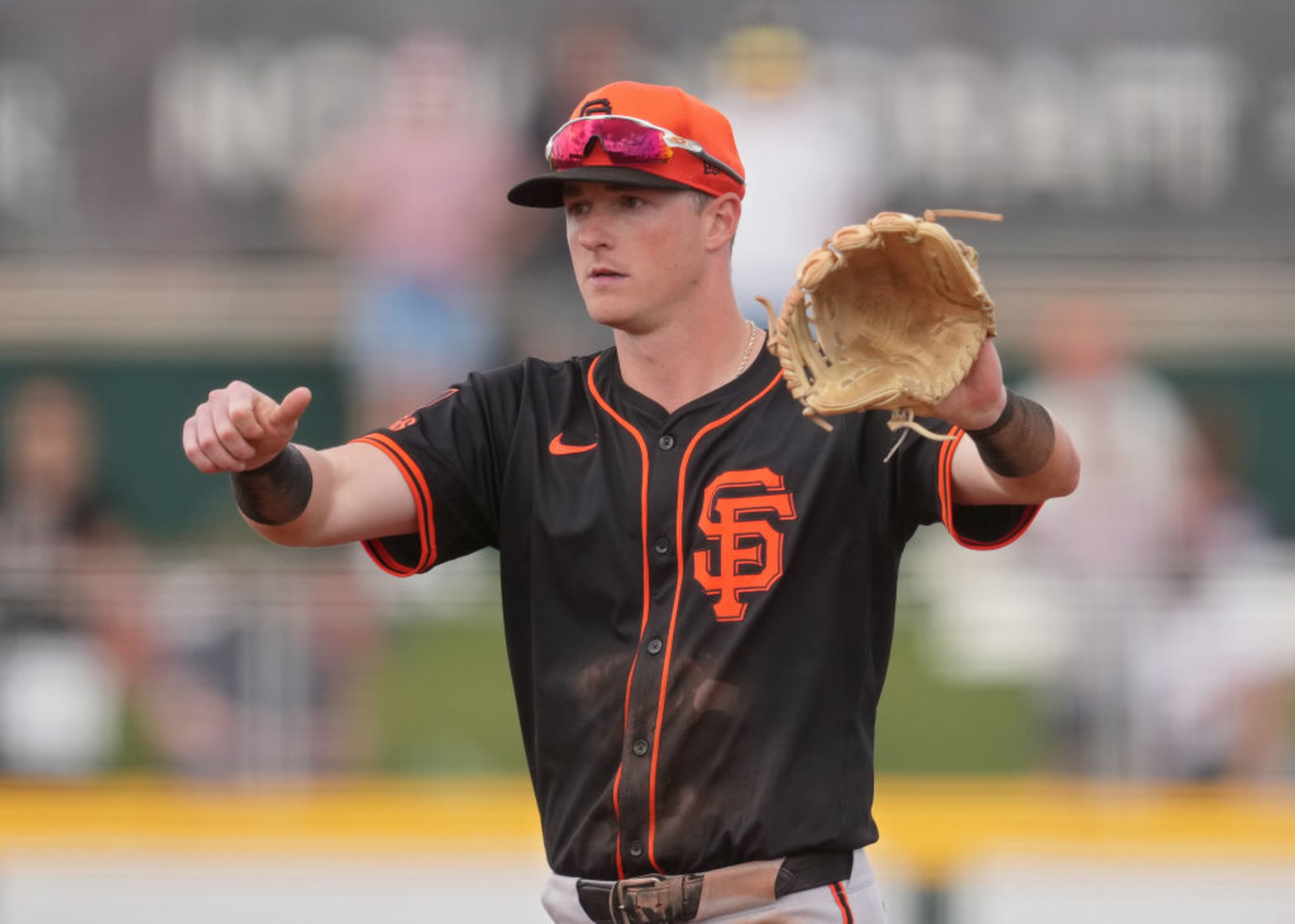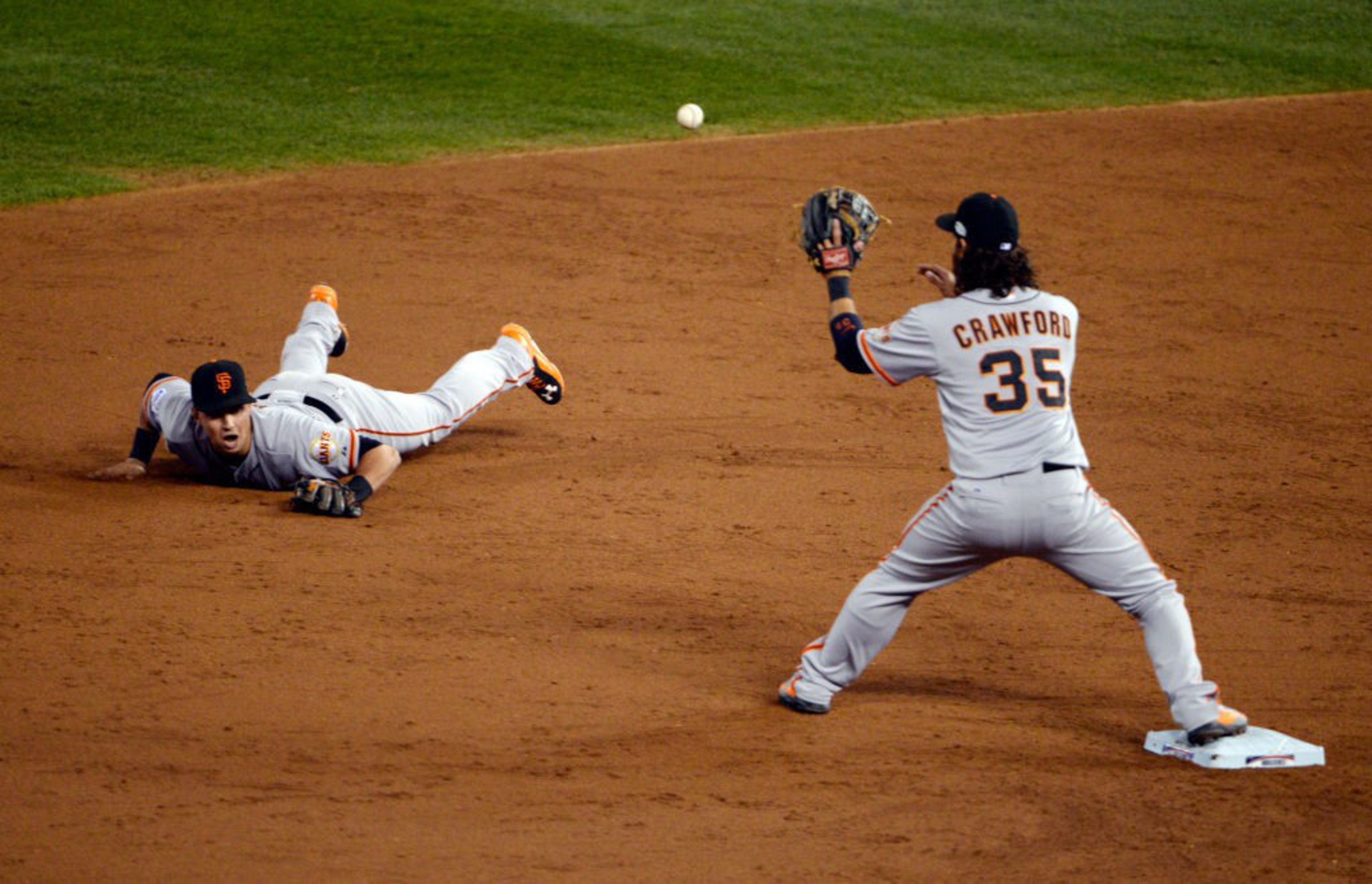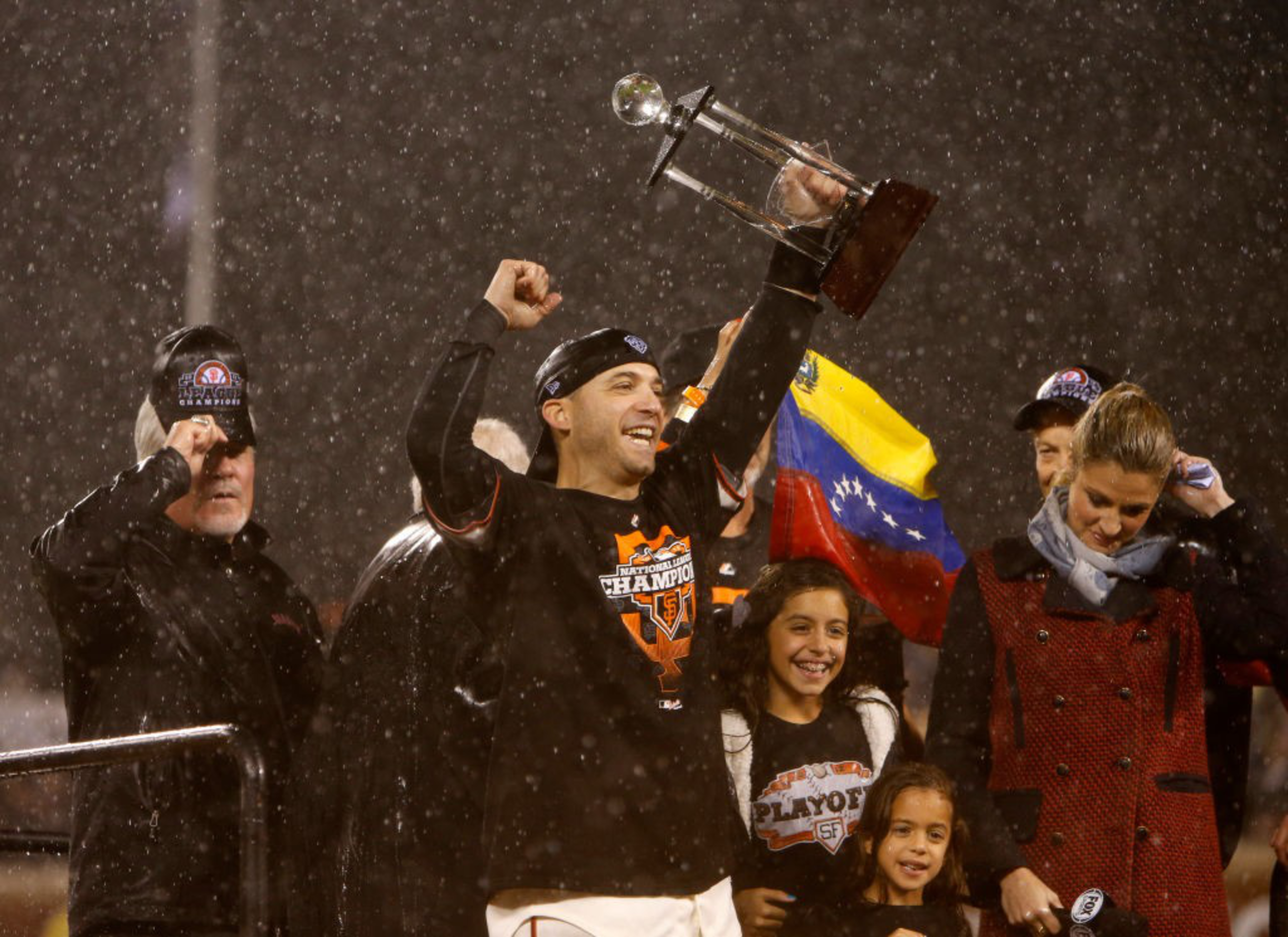SCOTTSDALE, Ariz. — With muddy spikes and a drenched uniform, Marco Scutaro extended his arms, playfully looked to the sky, and gleefully tasted the rain pouring down on the infield.
It was Scutaro’s lasting image as a Giant, forever etched in fans’ memories, coming moments before the Giants clinched Game 7 of the 2012 National League Championship Series with Scutaro ultimately crowned NLCS most valuable player.
Two years later, in another Game 7, this time in the World Series, Joe Panik dived to his right to steal a hard grounder headed to center field and, in one motion, while on his belly, glove-flipped the ball to shortstop Brandon Crawford to begin a pivotal double play, a key to the Giants claiming their third title in five years — and Panik’s own lasting image for Giants fans.
Learning from a couple of game-changing second basemen and World Series champions, Tyler Fitzgerald couldn’t have received better instruction than what he drew from Scutaro and Panik in recent weeks at the Giants’ training camp.
The heroes from 2012 and 2014 were among many former Giants invited by their old teammate, Buster Posey, to appear as guest coaches. It wasn’t coincidental that they were present at a time Fitzgerald, a shortstop by trade, was learning to play second base.
Section 415: Cricket is on the rise in the U.S., and the Bay Area is a hotbed

Section 415: Steph Curry, Jonathan Kuminga, and a Warriors season preview

Section 415: After the 49ers’ 4-1 start, what’s a realistic outcome for this season?

“It means the world to me,” Fitzgerald said. “It’s not so much they were here just to help in baseball. They were also here to help players off the field. Half our talks weren’t even about baseball. It was, ‘How are you doing mentally?’ ‘If you ever need anything off the field, let me know.’ It’s pretty cool to have those guys as friends that you can call on anytime.”
Like Fitzgerald, Panik was drafted as a shortstop and converted to second base early in his career, the position he predominately played in the majors. Scutaro spent most of his big-league life at shortstop, but Giants fans remember him at the end of his career for his work at second base.
Each was in camp for nearly a week, and each made an impact on Fitzgerald, who worked with Scutaro on hitting and Panik on defending — the epitome of expert guidance. Scutaro was one of the best contact hitters in the game’s history, well above 90%, and Panik’s footwork around the bag at second was textbook.
The hope is that the lessons will sink in. Fitzgerald enjoyed a breakout season in 2024 but had a high strikeout rate (108 K’s in 314 at-bats), and his defense at second base is a work in progress with the different angles and cutoffs, though he’s looking comfortable and competent in spring training.
“I think the adjustments will be minor,” Scutaro said. “He’s a strong kid and very athletic. Watching him take ground balls and play the position, I think he’s going to be fine.”

This was Scutaro’s first peak at Fitzgerald. Panik had seen him the past two years as a special assistant in the player development department, a role he’ll assume again in 2025 under Randy Winn and Kyle Haines, who oversee the farm system.
“If you’ve been on the left side of the infield your whole life, going over to second base is just a different look,” Panik said. “With his work ethic, passion, and baseball IQ, he’ll continue to get better during the season.”
This is about paying it forward for Panik and Scutaro. When Panik was coming up through the system, he picked up valuable pointers from players of previous generations including Will Clark, Rich Aurilia, and Jeff Kent, who suited up and worked with young players.
Panik learned hitting tips from Clark, a fellow left-handed batter, and the art of up-the-middle defense from Aurilia and Kent. In fact, Kent provided insight to playing second base that Panik used in his career and has shared with Giants minor leaguers.
“Stuff you don’t necessarily think about,” said Panik, noting Kent emphasized using the bag to push off from and even leap from on high throws. “Stuff that can save a ball from going into the outfield. It was literally just one little thing Jeff said 13 or 14 years ago, but I remember that. If I can give Tyler or Brett Wisely one thing to take away — and hopefully it’s more than one thing — for me, it’s a win.”
Fitzgerald said one of his biggest adjustments is learning the power feed at the bag — the across-the-body back flip, a quicker way to deliver the ball to the shortstop for a forceout or to begin a double play. Panik shared some footwork he learned from Kent and noticed quick improvement with Fitzgerald.
Turning a double play for a second baseman is extremely different, too. A shortstop approaches the bag with the second baseman, first baseman, and runner all in his vision while the second baseman comes to the bag needing to make somewhat of a blind turn before throwing to first.

Also, when covering second on a stolen-base attempt, proper footwork is necessary based on whether throws are coming from Gold Glove catcher Patrick Bailey, who has a quick release from different arm angles, or Sam Huff, whose release is more over the top. One ball can tail, another can carry.
Panik discussed all of this with Fitzgerald.
“The power feed is a new move for me,” Fitzgerald said. “My footwork’s getting a lot better.”
Unlike in Scutaro’s and much of Panik’s time, thanks to rule changes, runners no longer morph into linebackers and barrel into middle infielders to break up double plays. Therefore, the footwork is different. Second basemen no longer need to fend for their lives, but they do need to stay clear of the path of the runner.
“It’s so different now because you can’t obstruct,” Fitzgerald said. “We practiced a few different techniques. You can’t just cookie-cut it with your footwork.”
Panik recalled getting clobbered by overzealous runners, but nothing like what Scutaro experienced in the first inning of Game 2 of the 2012 NLCS when he took Brandon Crawford’s feed behind the bag and was clobbered and flattened by St. Louis’ Matt Holliday, whose hard, high slide went well past the bag, a tactic that’s now illegal.
Scutaro remained on the ground in pain for several moments, but he stayed in the game, got a couple of hits, and went 14-for-28 in the series to win NLCS MVP. Fittingly, as constant rain flooded the field, Scutaro caught Holliday’s popup for the final out.
“Water is life,” Scutaro said, recalling playing ball in a rainstorm. “That was weird. I spent four years in Oakland and a little time in San Francisco, and I’d never seen it pouring rain like that. All of a sudden, it came down hard. That’s why I was looking up. If it was a sign, I wanted to say thank you.”

Thirteen years later, however, Scutaro still feels the physical effects of his playing career, including the Holliday hit. His final season was 2014, and he got a second World Series ring though he appeared in just five games before requiring back surgery, and Panik eventually took over second base.
“I was in the right place when I was traded here,” said Scutaro, who was aptly nicknamed “Blockbuster” for how much he contributed after his July 2012 trade to San Francisco. “Unfortunately, I didn’t finish the way I wanted to. I played ‘13 through the pain. They sent me home in ’14. It was miserable. I couldn’t put my shoes on or tie my shoes. Four or five months after the surgery, I started sleeping better. I’m much better than before. There are good days and sometimes bad days. But I was blessed.”
Like Scutaro vividly remembers clinching the NLCS in the rain and sweeping Detroit in the World Series, Panik recalls the 2014 World Series journey like it was yesterday, including his glove flip to Crawford, whose throw to Brandon Belt was initially ruled too late, but the call was overturned.

“Nothing compares to the magnitude of Game 7 of the World Series,” Panik said. “In the moment, you’re not even thinking about what you’ve done. It wasn’t just a moment for me, Crawford made an amazing play on it, too, the catch and the flatfooted throw. Then the stretch at first by Belt. My friends, who I was fortunate enough to play alongside for years, to combine on a play like that, three homegrown Giants, now I get to smell the roses a little bit and appreciate those memories.”
Now it’s Fitzgerald’s turn to define his own career. Scutaro returned to his family in Miami, and Panik was to return to his family in New York after temporarily pivoting to minor-league camp to give further instruction.
Both former second basemen were grateful Posey brought them aboard and said they’ll be monitoring Fitzgerald’s progress.
“Buster was always one of the brightest players on the field, if not the brightest,” Panik said. “He always took ownership of the team, and with his love for San Francisco and the Giants, I feel this role was made for him because of how he handles people on a personal level. He understands what a team should look like and what it takes to win. I’m excited for him.”
